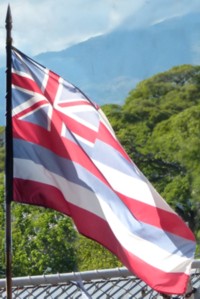World Wars
As a result of the Spanish-American war the US successfully took the Philippines, despite some spirited Spanish defence. But local leaders in the Philippines sought independence.
In their view one Colonial Power had been replaced with another, by another name. The patriots opposed US occupation and a long drawn out, bloody war resulted, during which some six thousand US troops were killed and an estimated quarter of a million Filipinos died. Many US liberals, like Mark Twain, were appalled.
During the US campaign to take control of the Philippines, Pearl Harbour and Camp McKinley became a stopover for troops en-route.
Yet it was not until the Russo-Japanese War (1904-5), when the growing naval power of Japan became evident, that serious military development took place. This foreign investment at last delivered some of the economic benefits longed-for by the white business community.
Large scale military investment began in 1908 and the first large US warship of a new Pacific Fleet entered the newly developed Pearl Harbour Naval Base in 1911.
Japan's growing empire - Pearl Harbour Museum
At the beginning of the First World War the US proclaimed neutrality. So nine German naval vessels sought sanctuary from the Japanese Navy.
Today it sounds odd that German warships fled the Japanese. But nine years earlier, in 1905, Japan had virtually annihilated the Russian Pacific Fleet: sinking 34 ships, including seven battleships. 4,380 Russians died and 5,917 were taken prisoner. 117 Japanese were killed.
During the First World War the Japanese were on Britain's side. So when the US eventually entered the war in support of these allies they captured nine German ships the first day. Nevertheless, it was becoming obvious that: 'the enemy of my enemy is my friend', and that Japanese and US territorial interests, particularly over the Philippines, would eventually clash.
The US had constructed among the world's most elaborate fortifications around Manilla Harbour and Subic Bay in the Philippines. Now the whole island of Oahu was fortified to become virtually impregnable to Japanese attack by sea. Several forts protected possible Japanese approaches with huge 14 inch 'disappearing guns' that could destroy a ship over the horizon, taking advantage of the island's high lookouts as well as aircraft for targeting.
Should a Japanese battleship somehow get within their visual range the big guns were protected by impregnable concrete bunkers and only appeared (popped-up) briefly to fire. Good quality roads provided quick military access to possible landing points for tanks and field guns. Soon primitive radar would scan the skies overhead.
From this impregnable harbour the world's most advanced battleships could steam out to meet the Japanese should they be foolish enough to engage with the United States of America. These great ships were anchored line astern and two abreast to protect the inner row in the event that they were attacked by air. This was most unlikely in any case as the harbour was too shallow for a conventional submarine and too shallow for aircraft launched torpedoes. Deck armour on the battleships was believed to be too thick for bombs to penetrate. Land and carrier based fighter aircraft assured air superiority.
The US and Japan were not the only powers around the Pacific. The British had a similarly 'impregnable' naval base in Singapore and Sydney Harbour too was protected by disappearing guns. Even Darwin Harbour in Australia's far north was protected by massive shore based guns and fighter aircraft. To the north of Australia the Dutch had the Surabaya Naval base in Java with similar defences and an allied fleet.
In each location, every-day military thinking was dominated by their pride and confidence in this technology. Troops practiced and re-practiced using it, but also frolicked in the sun, confident in their defences and assured that security lay in eternal vigilance. No one appreciated how vulnerable they were to innovative military tactics and superior aircraft technology.

